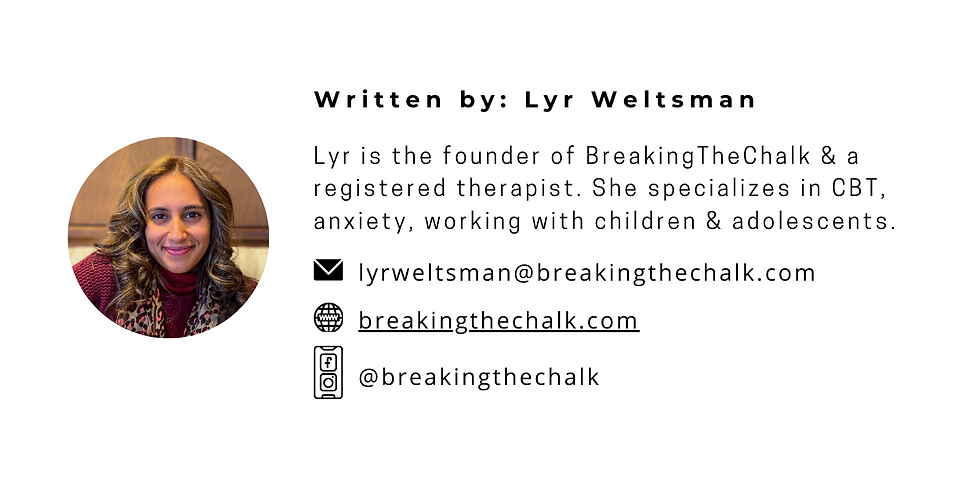3 Behavioural Signs of Emotional Struggle in Your Child
- Lyr Weltsman

- Apr 29, 2024
- 3 min read
Children present their internal struggles through behaviours and they are often our best sign to know if our child is struggling. In my practice I see patients who often present the same behavioural signs and there is an overwhelming need for parents to know how to help their child effectively.
In this blog post I will share how to pick up on the signs and what to do about them. Remember, each child is different so some of the signs may look similar
Severe Outbursts or Meltdowns:
Children and teens may have an increase in their reactions and responses to you, their environment, and experiences. As they feel a lot on the inside, they don’t know what is going on, how to process it or verbalise what they are feeling.
They are more on edge, sensitive, and can easily feel overwhelmed. This may be presented through anger outbursts, meltdowns of excessive crying, panic attacks, etc.
What to do?
Understand the core reason for WHY this is happening! I always ask parents; to look for triggers and patterns.
To be validating and patient that these behaviours have a deeper meaning to them and it is not them being naughty or rude. We need to give space to feel, check in with how they are feeling and ask deeper questions around what is happening in their internal worlds, to think of any changes that have happened (even the smallest ones), and spend one on one time.
2. Defiance and Resistance:
Many times because of your child’s emotional struggle they need a sense of control. Hence, we often see defiance happening when you decide something, say “no”, put a boundary, etc. During this, specifically older children and teens, tend to be more argumentative. They want to decide and stand their ground. They are often resistant to getting close, opening up, accepting help from you or a professional and are uncooperative.
Your child will often make excuses for why they don’t want to go to school or an activity - I see child patients use a physical symptom as an excuse.
What to do?
Give space when they need, give two options for defiance, give space to their opinion and they are our best clue to know how to help them and trust that. Perhaps they do need a mental health day from school and that is okay! Be intrigued by “what” and “why” they don’t want to go.
3. Change in Habits
It’s often presented in small things. Your child may show change in their eating habits (either more, less, or a tendency to be in control of it), change in their motivation at school (change in marks, study habits, etc), isolation with friends (don’t want to see them, interact less, staying home and in their rooms more), change in clothing, etc.
What to do?
Take note of your child’s behavioural and habit patterns - this is key to notice consistency. Be aware of any small or big change and keep track. Be intrigued, reassure, and ask deeper questions around their behaviours without judgement or a big reaction.
Most importantly, take everything they say and express seriously. We need to trust our children that they know what they are feeling. Hear what they have to say, always offer to help, and acknowledge and validate their emotions and challenges.
In my practice, I work closely with parents to guide and give an understanding about their child’s emotional struggle. Continuous communication, support, and feedback is given to both patients and parents to ensure effective support and treatment. We focus on long term wellbeing.
Have a look here for more one on one support:










Comments